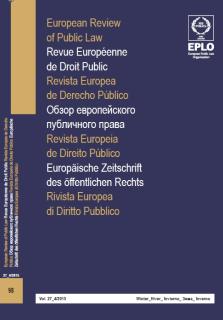
REFLECTIONS ON THE CONTRIBUTION OF ADMINISTRATIVE JUSTICE
TO THE CONSOLIDATION OF THE RULE OF LAW
H.E. THE PRESIDENT OF THE HELLENIC REPUBLIC PROF. PROKOPIOS PAVLOPOULOS
This article states that the rule of law requires the existence of a state, the organisation and function of which are governed by legal rules. Complete legal rules are required, the breach of which produces, through the appropriate sanctioning mechanisms, legal consequences both as to the validity of the illegal acts and omissions of the state organs and as to the legal ramifications against the perpetrator. The most important sanctioning mechanism is the one based on the organisation and functioning of the judiciary, especially the Administrative Justice. Having in mind that the latter is set to deal with disputes in exercising, on behalf of anyone who has a vested interest, the right to petition and receive judicial protection, the analysis is divided in two parts. In the first part, the institutional nature of the right to petition and receive judicial protection is explored. The second part is dedicated to the legal peculiarity of the public law dispute, through which it becomes easier to decipher the contribution of Administrative Justice to the consolidation of the rule of law and the principle of legality by high-lighting the general tendencies of mutation of the legal rules and, consequently, of the legal order under the prism of the significant changes in the field of social and economic affairs, combined with the current unprecedented and deep economic crisis. These latter elements also highlight the inherent relativity of the legal rule a) at the stage of shaping its institutional substance, b) at the stage of its implementation and c) at the stage of its judicial interpretation and implementation.
Cet article dispose que l'Etat de droit exige l'existence d'un Etat, dont l'orga¬nisation et le fonctionnement sont régis par des règles juridiques. Des règles juridiques complètes sont nécessaires, dont la violation produit, par des mécanismes de sanction appropriés, des conséquences légales en ce qui concerne tant la validité des actes illégaux et les omissions des organes de l'Etat que les ramifications légales contre l'auteur de ces actes. Le plus important mécanisme de sanction est celui fondé sur l'organisation et le fonctionnement du système judiciaire, notamment la Justice Administrative. En ayant à l'esprit que cette dernière est établie pour traiter des litiges concernant l'application, de la part de tous ceux qui on un droit acquis, du droit de pétition et de recevoir de la protection judiciaire, l'analyse est divisée en deux parties. Dans la première partie, la nature institutionnelle du droit de pétition et de recevoir de la protection judiciaire est explorée. La deuxième partie est dédiée à la particularité juridique du litige de droit public, à travers lequel il devient plus facile de décoder la contribution de la Justice Administrative à la consolidation de l'Etat de droit et du principe de légalité en soulignant les tendances générales de la mutation des règles juridiques et, parallèlement, de l'ordre juridique sous l'angle des changements significatifs dans le domaine des affaires sociales et économiques, en combination avec la crise économique actuelle sans précédent. Ces derniers éléments soulignent aussi la relativité inhérente de la règle juridique a) au stade de formation de sa substance institutionnelle, b) au stade de sa mise en œuvre et c) au stade de son interprétation et mise en œuvre judiciaires.





















